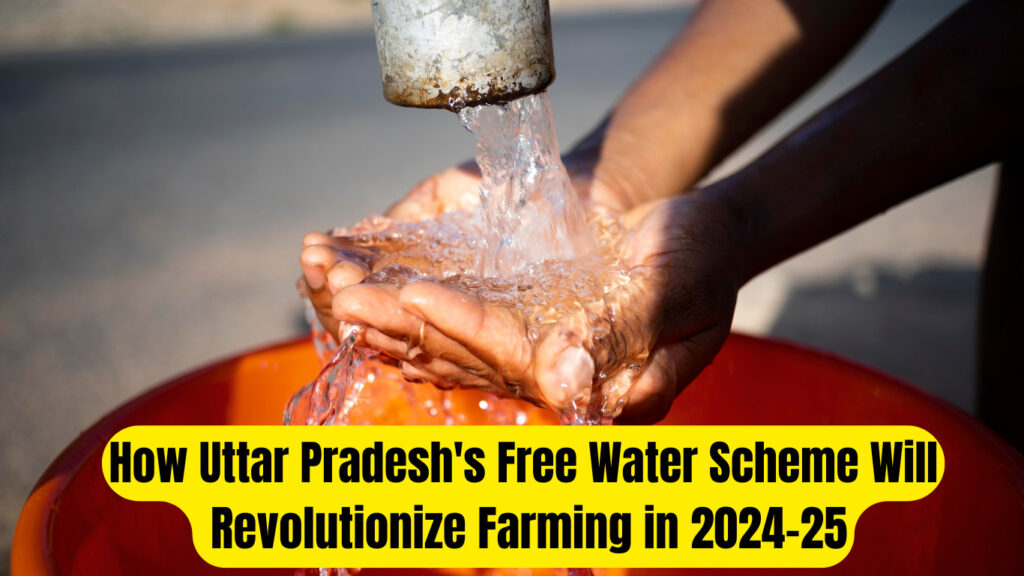
How Uttar Pradesh's Free Water Scheme Will Revolutionize Farming in 2024-25
As the most agriculturally important state for India, water scarcity and erratic rainfall have always been Uttar Pradesh’s twin specter that seriously affects yields. The Free Water for Farmers Scheme is something that can address this problem face-on and boost productivity in agriculture. A great ₹1,100 crore has been dedicated to this revolutionary initiative in the 2024-2025 budget. Its investment directly breathes new life into agriculture in Uttar Pradesh and benefits millions of farming families, thereby greatly boosting the state’s economy.
Agricultural Employment The state has agricultural engagement with more than 70% of its population. In the agricultural sector in Uttar Pradesh, the primary activity is irrigation. Besides monsoons, which course their way to provide requisite relief, erratic rainfall makes it a spotty affair, especially in arid or drought-prone areas, leaving farmers aghast in hopes of irrigating fields. Traditionally, it has been groundwater as the main source of irrigation, which today is becoming very scarce due to over-extraction and lack of replenishment.
This crisis has demanded one action on part of the Uttar Pradesh government: the Free Water for Farmers Scheme, designed to ensure that farmers have constant access to water sources to irrigate agricultural crops without involving expensive costs. It targets water availability among farmers, who mainly rely on the tube well and other water facilities to irrigate crops in dry regions, as natural rainfall usually has too low a heads up to meet agricultural requirements.
Table of Contents
The core features of the Free Water for Farmers scheme
The Free Water for Farmers Scheme is one of the larger agricultural reforms planned by the Uttar Pradesh government for 2024-2025. The amount that would have been provided to this scheme is ₹1,100 crore and is largely meant to upgrade the infrastructure that will provide free water supply to farmers for irrigating their crops. The government promises this will be done judiciously-most particularly in the rural settings, where it is needed the most.
1. Free Irrigation: The government would provide free water so that the irrigation cost burden on the farmer would be diminished completely. It will help farmers cultivate crops without worrying about the water bill, particularly when it is most needed for growing.
2. Emphasizing Water Conservation: The policy is not just to supply water; it is supposed to be supplied in a better manner. The government plan will include improvements to the management system currently in existence, such as canal strengthening and pump station upgrading. Therefore, water supply would emerge more effective and sustainable, especially in drought-prone areas.
3. Support to Crop Productivity: The free water program has a very close nexus with the increase in crop productivity. With assured irrigation, crop health will be ensured and the risk of crops failing because of lack of water will not haunt farmers; crop yield will increase and increase the prosperity of the agricultural society.
Gains for the farmers and rural economy
This scheme far extends the benefits that the applicant would receive free water, as the initiative is bound to have a ripple effect on the overall agricultural economy of Uttar Pradesh in addressing one of the most basic issues confronted by farmers. Let’s look in a little more detail at the main advantages:
1. Lower Cost: Irrigation charges sometimes form a major cost head by any farmer. The complete wash out of water charges would directly reduce the cost burden on the farmers and divert resources to other key areas like seed, fertilizer, and labor cost.
2. More Agricultural Productivity: Adequate and guaranteed water supply will provide one with a possibility of regular irrigating the crop, and this allows for higher yields and quality. This in turn would increase the farmer’s incomes, which is the ideal circumstances about such family’s well-being and economic stability.
3. Increased Food Security: When in agriculture yields are increased, the benefits are not just to feed the farmer but also improve food security in Uttar Pradesh and the country as a whole. There will be much more surplus to have locally and to export to national markets stabilizing prices for food.
4. Rural Economic Growth: All of the rural economy will be covered with productive farmers who can benefit from at least some of the fruit of productive agriculture. More successful farmers require more goods and services, thus creating an ever-increasing multiplier effect on other local businesses, jobs, and enterprise in the countryside, thereby improving the quality of life for very many dependent upon agriculture.
Financial Security and Empowering Women: Uttar Pradesh Government Pension Scheme
Linking Up with Other Agricultural Reforms
In this regard, the Free Water for Farmers Scheme is but part of a larger framework of agricultural reform in Uttar Pradesh. It is thus combined with initiatives for irrigational system efficiency across the state, advanced water-saving technologies, and resource-friendly farming practices.
In this, electricity bills have been waived for the farmers who use private tube wells. Whatever programs will be included, this will be a new scheme of the Uttar Pradesh government. This has been presented in the Budget of 2024-2025, and it is said that nearly 1.5 crore farmers would be benefited due to the eradicating the financial burden of electricity cost towards water extraction. Such initiative will allow the state government to guarantee continuous access to water resources for such farmers without adding the burden of electricity tariffs and create an enabling environment for better farming practices.
Water Scarcity and Sustainability
Another important aspect of the scheme is water sustainability. Free supply of water will also help farmers in assisting them, but it will also have to be used efficiently as well. The State Government has assured modernization of irrigation systems and encouraging water-saving technologies such as drip irrigation and rainwater harvesting.
It is not only a supply of water but also judicious use. The Uttar Pradesh agriculture department, for example, plans to unveil training schemes for farmers for the implementation of such water-saving measures. In its turn, this would ensure that the benefits of the Free Water for Farmers Scheme keep flowing in the long run, thereby safeguarding state water resources for generations hence.
Challenges and the Road Ahead
Though the scheme has bright prospects, it has negative aspects. The wide agricultural span across the state needs gigantic infrastructures in the form of new pumps, pipelines, and water storage systems. The water has also to be distributed uniformly across regions-in the scarce water zones-partly requires considered planning and execution.
The second challenge is to implement water-saving technologies effectively. Uttar Pradesh is pursuing the implementation of these techniques, but it would take some time for the widespread implementations to be done among farmers, mainly with small landholdings.
To overcome such challenges, the state government must work in close collaboration with agricultural experts and the local administrations, as well as cooperatives of farmers, in implementing this scheme well and effectively. Cooperation will be key in the long-run success of the program.
Conclusion
The Free Water to Farmers Scheme in Uttar Pradesh is a bold and long-overdue measure to enhance the productivity and sustainability of agriculture. Free irrigation to farmers means the state government is directly striking at the crucial cause in farming-fundamental water scarcity. This alone, backed by other conducive reforms such as waiver of electricity bills and infrastructural development in irrigation, should do all the tricks to change the state’s agricultural sector.
Therefore, this scheme will, in a way, become a driving force for the economic growth of Uttar Pradesh in ensuring food security and sustainability of its farm future. Its success could further help other states to follow the example while relating such schemes as imperative investments for agricultural renaissance, hence for the overall development of rural India.




2 thoughts on “How Uttar Pradesh’s Free Water Scheme Will Revolutionize Farming in 2024-25”